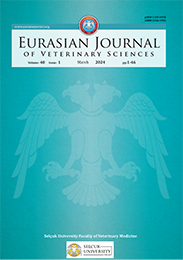| 2022, Cilt 38, Sayı 1, Sayfa(lar) 007-016 |
| [ Türkçe Özet ] [ PDF ] [ Benzer Makaleler ] |
| Occurrence and antibiotic susceptibility of Vibrio spp., Aeromonas spp. and Listeria spp. in seafoods |
| Nihat Telli1, Arife Ezgi Telli2, Yusuf Biçer2, Gamze Turkal2, Hatice Ahu Kahraman3, Yusuf Doğruer2 |
| 1Konya Technical University, Vocational School of Technical Sciences, Department of Food Processing, Konya, Turkey 2Selcuk University, Veterinary Faculty, Department of Food Hygiene and Technology, Konya, Turkey 3Mehmet Akif Ersoy University, Veterinary Faculty, Department of Food Hygiene and Technology, Burdur, Turkey |
| Keywords: Aeromonas spp., antibiotic resistance, Listeria spp., seafoods, Vibrio spp. |
| Downloaded:893 - Viewed: 1141 |
|
Aim: In this study, it was aimed to determine the presence of Vibrio spp.,
Aeromonas spp., and Listeria spp. in finned fish and shrimps consumed in
Turkey and the antibiotic resistance profile of the isolates using disc diffusion
method.
Materials and Methods: In the research, 300 seafoods obtained at different times were used as material. Following isolation by classical cultural method, classical PCR was performed to confirm the isolates at genus level and to identify at species level for pathogenic species. Results: Finfish and shrimp samples were contaminated with Vibrio spp., Aeromonas spp. and Listeria spp. with the rate of 19.4% (33/170), 14.7% (25/170), 4.1% (7/170) and 13.8% (18/130), 13.1% (17/130), 6.2% (8/130), respectively. Twenty-nine (9.7%) and 9 (3.0%) of the Vibrio spp. isolates were identified as V. parahaemolyticus and V. cholerae, respectively. Thirty (10%) of the Aeromonas spp. isolates were detected as A. hydrophila. L. monocytogenes and V. vulnificus was not detected in any of samples. Antibiotic resistance profile of the V. parahaemolyticus, V. cholerae, A. hydrophila and Listeria spp. isolates was streptomycin (71.4%), teicoplanin (71.4%), ampicillin (87.5%), teicoplanin (75%); streptomycin (80%), ampicillin (75%), cefixime (75%), penicillin (75%), sulfamethoxazole/trimethoprim (100%), tetracycline (75%); erythromycin (93.8%), vancomycin (81.2%), amoxacillin/clavulanic acid (78.6%), ampicillin (85.7%), cephalothin (92.9%), penicillin G (92.9%); and cephalothin (37.5%-42.9%), erythromycin (37.5%-42.9%), penicillin G (37.5%-42.9%), tetracycline (37.5%-42.9%), respectively. Conclusion: As a result, it is thought that fish and shrimp consumed in Turkey may be contaminated with pathogenic Vibrio and Aeromonas species, and antibiotic-resistant isolates may pose a risk to public health. |
| [ Türkçe Özet ] [ PDF ] [ Benzer Makaleler ] |




